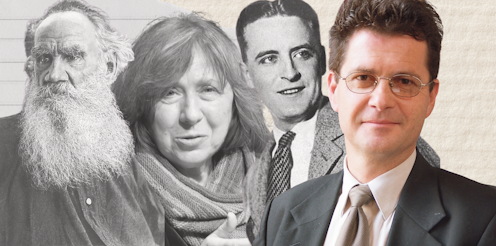Plagiarism, John Hughes’ The Dogs and the ethical responsibilities of the novelist
- Written by Alyson Miller, Senior Lecturer in Literary Studies and Professional and Creative Writing, Deakin University

John Hughes’s novel The Dogs has been withdrawn from the longlist for the Miles Franklin Prize after an investigation by The Guardian[1] identified numerous instances of plagiarism. Hughes’s lifting of passages from other books has sparked furious debate and literary detective work – mostly on Twitter – prompting questions about the nature of influences, literary pastiche and the attribution of sources in novels.
Hughes acknowledged he had unintentionally borrowed from the 2017 English translation of Nobel prize laureate Svetlana Alexievich’s The Unwomanly Face of War, after The Guardian applied document comparison software to both books, finding 58 similarities and some identical sentences.
Further investigations by academic Emmett Stinson and writer and critic Shannon Burns exposed the apparent copying of passages from books such as Anna Karenina, All Quiet on the Western Front, and The Great Gatsby[2].
This week, meanwhile, poet Lachlan Brown has posted a series of Google documents[3] identifying similarities between phrases and passages in The Dogs and those in Eric Newby’s Love and War in the Apennines, W.B. Sebald’s The Emigrants, Amos Oz’s Judas[4], and Loren Eiseley’s The Invisible Island[5].
Australian National University academic Millicent Weber has also added to the growing list[6], highlighting similarities between phrases used by Hughes and phrases in work by five other writers including Saul Bellow and Nadezhda Mandel’shtam.
In response to the accusations of plagiarism, Hughes released two statements. In the first, he explained he had inadvertently incorporated passages typed up from Alexievich’s book[7] into transcripts from his grandparent’s stories of surviving the second world war, which appear fictionalised in The Dogs. Hughes apologised to Alexievich and her translators “for using their words without acknowledgement”.

















